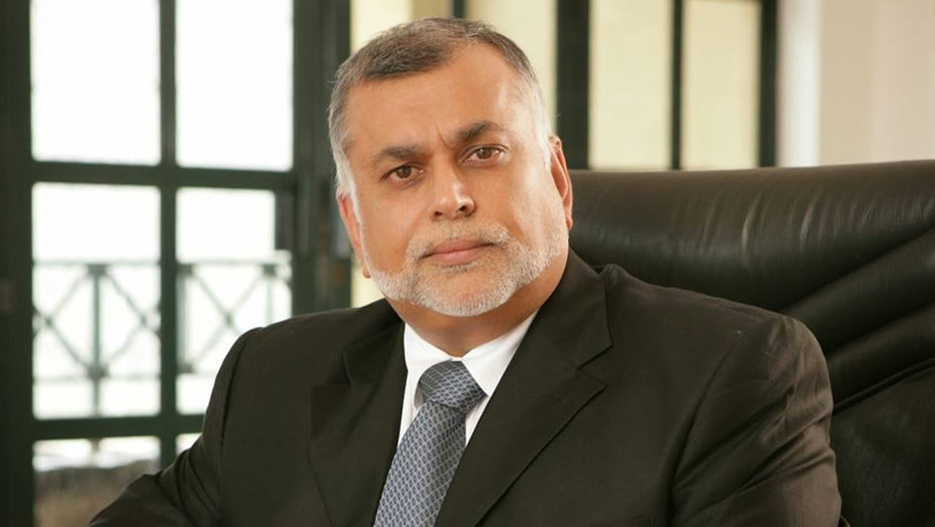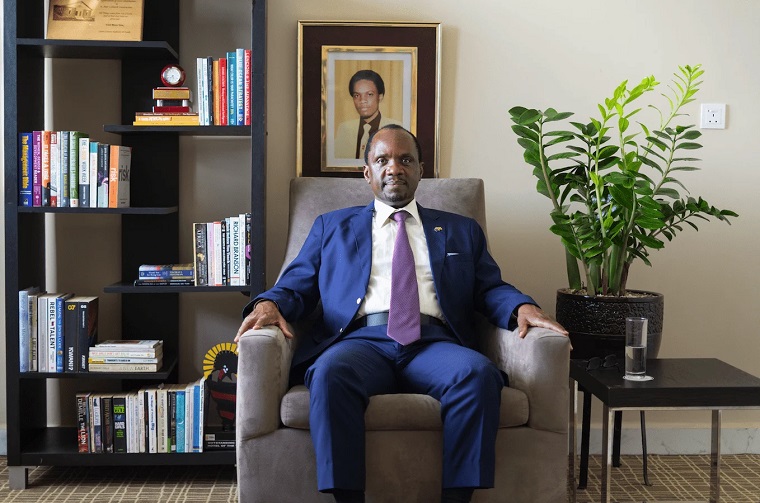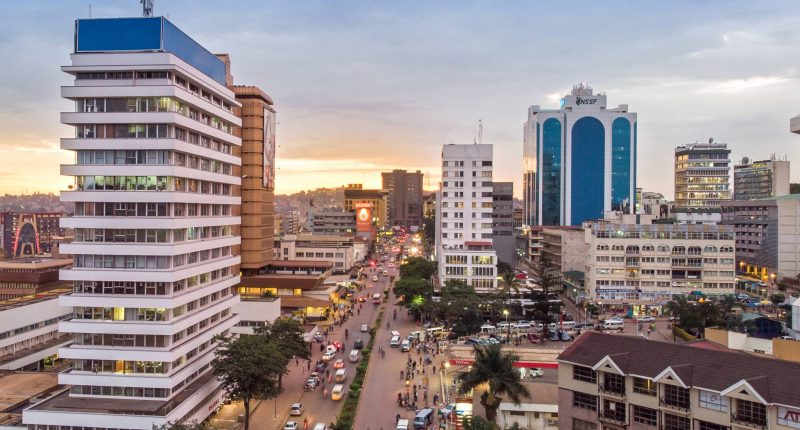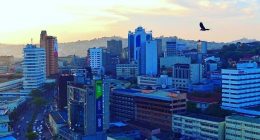At the height of one of Uganda’s usual scandals, that blight the scowling, grumbling, and often angry visage of this so-called hopeful nation nowadays, I ran into Mr. Patrick Bitature on an exercise bike. This was past the 2016 election and before the dismembering of Crane Bank that would soon follow. Indeed, from his workout spot at Kabira Country Club where we held a brief conversation – he could probably see the ubiquitous Crane Bank ATM at the guarded entry of the club.
Draped in orange and gold colors, the ATM is one of the oldest in the city. Back when this ATM was first established the country club itself was truly exclusive. The corporate class of university-educated multitudes that make up the lawyers, bankers, marketers, telecom executives, self-styled influencers, and others that have embraced the club—alongside the tourists, expatriates, and Chinese—were not, as is now, the primary customers at the gym, the restaurant, and the spa.
One could observe from the same spot, even as early as 6:30 am, traffic jam outside the gates of the club conveying hundreds of professionals from the nearby uptown areas of Ntinda-Kisasi, Kiwatule, Kyambogo, and further afield on their way to build on their dreams or hold on to what they already have.
The road outside the Kabira club of the mid-2000s was quieter; the club itself a retreat where deals could be done and were done. Sure, in the parking lot were personalized number plates including two or three cars belonging to the Sudanese-Ugandan coffee and grain traders, the infamous AYA Group based in Kawempe, that seemed permanently parked next to the entrance. The one marked SENIOR, a Mercedes Benz, belonged to the chain-smoking scion of that family whose evil genius was to be feared if not respected in the city.
Across the road in the suburb of Naguru were then still empty plots without the storied apartments including Skyz Hotel owned by Bitature that today dominate the skyline. Ever the expansionist Sudhir Ruparelia – the naturalized Asian-Ugandan who made his fortune in Real Estate and Financial Services, had already snapped up some adjacent plots that have since then joined the Club’s offer like the nearby Forest Cottages – a favorite of adrenaline-high visiting military personnel who, when Uganda was engaged in joint military operations in the DRC and the Central African Republic, would use the gym early in the morning and hit a nearby club rumored to be run by an arms dealer and his Muslim-Ugandan partner.

Today, the once-proud slum of Naguru that reached out to the Lugogo by-pass and spilled violence on commuters in the early evening is being swallowed by gentrification along its edges—now sandwiched between the doomed Naguru Housing Project and other developments on the hill where new swanky apartments, bars, medical services, hotels, and showrooms are swelling with the new wealth of the times. Personalized number plates have not completely gone out of fashion – but the wealthy now are heralded by hired police escorts and prefer sirens and disco lights on the grilles of their SUVs.
The owner of Kabira, Mr. Rupareila, and Mr. Bitature have followed a similar path. One can count several buildings worth millions of dollars today owned by the pair from the spot where the Crane Bank ATM still stands. They were partners at one point in the 90s and there is even a positive story out of it. It has to do with the liberalization of forex trading. The then Marxist-leaning Museveni government (it is the same one today but let us say Marx has switched places with Adam Smith!) was paranoid about international trade and considered the exchange of forex, necessary for traders doing import/export, to be criminal activity if not outrightly subversive. Mr. Rupareila, who had set himself up informally as a go-to person for the dollar and other foreign currency mostly traded a small margin by receiving currency from expatriates and giving them local currency reliably. Bitature, the younger but ambitious businessman was just starting out. His own part in this was procuring foreign currency for gold traders operating in DRC and Burundi. Security officers eventually apprehended Sudhir while Bitature, sought after as a witness in the investigation, was able to “leave the country”.

As the matter was settled (Sudhir would do time in Luzira prison meanwhile), the government educated itself about currency trading and why government control was detrimental. Fast forward, President Museveni, now convinced that this was not an open flank for infiltration and sabotage by enemies of Uganda, conceded to the liberalization of the forex trade. Regaining his freedom, Sudhir would go on to set up Crane Forex Bureau, a truly pioneering service in the country and forerunner to his Crane Bank empire.
Unlike neighboring Kenya or Tanzania however or in fact, several other African countries outside of South Africa, Egypt, and Nigeria, the wealthy in Uganda still measure their worth in millions of dollars and not billions. Fortunes accumulated from real estate or financial services have never been able to scale.
The reasons are mostly political though often not discussed. To put it plainly – successive Ugandan governments have never been comfortable with a wealthy, independent domestic economic class. The effect has been—also to state it plainly—that the so-called wealthy class remains a narrow state-based, and often state-dependent class whose horizons are further limited by rivalries that are the inevitable consequence of seeking and depending on favors from the state or fear of offending it.
Moreover, there are other deleterious effects of decades of cuffing the private sector to the limited ambition of the state, especially where such ambition attenuates at stability before anything else.
First, there is the fact, for which evidence is abundant, that the structure of the economy remains unchanged. The economy is still agrarian with pockets of industry that while expanding are not doing so with the earnestness that politically driven industrial transformation has occurred elsewhere—such as Germany under the Third Reich to use an extreme example or South Korea with its Chaebols (family empires like Samsung and Hyundai who are the direct result of state patronage) or even Singapore—Lee Kuan Yew’s modern miracle often cited by Ugandan civil servants with emotion but with the knowledge that even a technical civil service is no match for fundamentals determined and controlled by the political center. Those fundamentals have as their cardinal faith and operating principle the preservation of state security and therefore stability before everything else.
A good example of how constrained domestic capital is is the recent shock from Covid19.
Correctly seen as a national crisis, Covid19 itself was re-interpreted through the security-first creed. While policies like import-substitution, the first floor of elevation for domestic capital in which the state assists the local manufacture of products with capital grants and tax relief and other preferential treatment, the policy was attended to aggressively as long as the threat of COVID remained pre-eminent. Thus, like other pandemics including HIV/AIDS and Ebola, once the crisis ceased to be a direct threat to security and stability, the private sector which had emerged and held its own, in fact, shown tremendous promise, was once again returned to its place.
While the pandemic raged Ugandans invested heavily in the sectors identified for import substitution. The Uganda National Bureau of Standards that was drafted into fast-tracking certification for example registered over 270 licenses for hand sanitizer production in the first three months of the lockdown where only 3 companies qualified at the start. This figure would drop to around 65 companies still operational at the time most COVID Standard Operating Procedures were lifted. Still, it is a sign of what such a policy can do as seen from Uganda’s experience compared to far more advanced economies. Some of these suffered severe shortages of Personal Protective Equipment as well as limits to services such as PCR testing – which while expensive was readily available even in rural Uganda was a struggle to procure at the heart of London. If the aggression were not tethered to conditions of imminent national security, the transformative agency may well be unleashed.
After decades of this treatment by successive governments, the mindset of the Ugandan domestic capitalist is dejected and despondent, obsequious to power and authority, and unable to negotiate its interest with confidence. The private sector is the orphaned child of Ugandan politics. Born out of wedlock—that unhappy contact between Uganda and state-assisted colonial capital (the irony here being that the British East African Company and its disastrous cousin the British East India Company were the Chaebols of Imperial Britain), the sector has been fostered, often abusively, by relatives of those in power, well-wishers, foreigners or global Samaritans who owe no permanent responsibility and behave like most foster parents: as people with children of their own.
To borrow the term from a book on the subject “Uganda: A Crisis of Confidence,” by the late Ali Kirunda Kivejinja, the account of this crisis has mostly been elite political competition which has smothered or submerged domestic economic growth under the weight of its disagreements and fears over time. These effects on the cultural environment for entrepreneurship can be seen every day but are best captured by the phrase “growth without transformation”.
Ugandans, we, are very busy. There is a lot of activity. The hustle is also not without imagination. Especially today, at the heart of the economic districts, every mile is a testament to the immense creativity of Ugandans from telemedicine to financial products built on modern telecommunications. There is ingenuity everywhere in every sector but the ability of this to scale remains in question. Growth without transformation has a twin sister in the West. An imbroglio of a different but similar catch where forward has stalled.
I found this in the debate hosted by New York Times columnist Ezra Klein and featuring the author Ross Douthat. Douthat who is also a New York Times columnist has written a book “The Decadent Society” in which he cites America’s problem as decadence or “a situation in which repetition is more the norm than innovation; in which sclerosis afflicts public institutions and private enterprises alike; in which intellectual life seems to go in circles; in which new developments in science, new exploratory projects, underdeliver compared with what people recently expected”.
Klein summarized this more aptly as “affluence without growth”. Inversely, Uganda suffers from its own form of decadence. It is the same lack of motion albeit in a poorer society but nonetheless one which has always been judged to have greater promise or what we know as growth without transformation.
Nowhere is it more evident than the absence amongst the citizens of the billionaire.
In Part II Angelo picks up his gym conversation with Patrick Bitature, reflects on Minister David Bahati’s “five loaves of bread”, and examines why after nearly 60 years of independence there is no dollar billionaire in Uganda.









